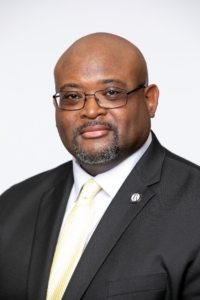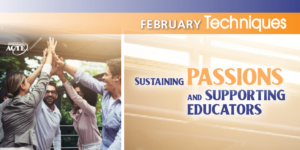 Meet Donald Walker, a career and technical education (CTE) trainer working with CAST. Walker delivers in-person and remote professional learning, technical assistance, coaching, guidance and support in a variety of contexts across the country. His efforts also support CTE-based grant writing, data analysis and content development. CAST is an educational research center that seeks to expand learning opportunities so that all students may succeed.
Meet Donald Walker, a career and technical education (CTE) trainer working with CAST. Walker delivers in-person and remote professional learning, technical assistance, coaching, guidance and support in a variety of contexts across the country. His efforts also support CTE-based grant writing, data analysis and content development. CAST is an educational research center that seeks to expand learning opportunities so that all students may succeed.
Walker’s interview appears as the second installment in a spotlight series on education leaders and members of ACTE’s inclusion, access, equity and diversity (IAED) advisory group. As ACTE strives to build an inclusive culture — celebrating the diversity of the CTE community — the advisory group provides recommendations, expertise and outreach to support this important work. Read on to hear from Donald Walker as he discusses his educational experience and what education leaders can do to develop more inclusive learning environments.
Please share a little bit about yourself. What inspired your interest in CTE?
I am a radio broadcaster and now a video storyteller by trade. I have spent the last 31 years teaching in a trade school and later working as a videographer and editor for Detroit Public Schools Community District. Then I became director of the multimedia program at the Detroit School of Arts.
CTE was my savior in high school. I found the high school’s radio station and quickly found it was something I could claim as mine during a time when I was rather lost. I was good at it, too.
When I tried college as I was expected to do, I failed miserably because I was too distracted and did not have a plan. Though I was smart enough to go to college, I was not ready for that life.. But I was ready for my passion, which was (and still is) radio. My trade school was a place of extreme pride and joy. I excelled! Later, I returned to work at that school to give to others what I received… a chance to achieve their dreams. The rest is history!
What was your education experience like? What did you study?
As I mentioned, my first attempt at college was terrible. I was not ready. So, my true educational experience began at the Specs Howard School of Media Arts. It was fantastic! I loved spending every day connected to what interested me. I worked harder than I had before, and I was the first in my class to get a full-time job “in the business.” (In 2020, I was inducted into the Specs Howard Hall of Fame along with several of my peers.)
After working for about a year, I went back to college to get my degree, fulfilling a promise I made to my grandmother. I studied communications and worked part-time in the radio business and taught at Specs Howard. It took me 10 years, but I finished cum laude! I went on to earn an MBA, and now I am a doctoral student at Wayne State University.
What barriers did you face in pursuit of postsecondary education? How did you overcome those obstacles?
Having been a first-generation college student, I found that people don’t really understand how much of a barrier that really is. Not knowing how to navigate the system, how to deal with professors, how to handle the homework load, etc., can be daunting. Especially since I was working full time! I wanted to drop out more times than I can say. At every level this has been a challenge, except now at the doctoral level, because my wife has her doctorate and she has been guiding me!
Lack of representation is a barrier.
When I enrolled in college, I did not realize how important it was to find someone who looked like me until I met Dr. Lyn Lewis. Having someone who understood my culture and challenges as an African American was invaluable. She knew how to challenge me, and she was someone I could look up to. She reflected and understood parts of me; I didn’t have to explain. Often, I wonder where I would be if I had met more teachers who looked like me and who could have helped guide me through the college life experience.
Please briefly discuss your role with ACTE’s IAED advisory group.
I am new to the group, so my role is being defined with each experience. For now, I want to serve and provide whatever insight I can, leveraging my personal, professional and academic experiences. I hope to open doors and minds, challenge people’s thinking, and expand my own perspectives.
How can education leaders act courageously to develop stronger, more inclusive learning environments for all?
Introspection. Honest, deep, courageous introspection. Honest introspection leads to awareness, which can be frightening and requires true courage but leads to growth. Growth leads to innovation, expanded thinking and positive action, which support everyone.
I’m paraphrasing Frederick Douglass (1857) when I say, if there is no struggle, there is no growth. For progress to occur in our education systems, educators must engage in reflection. Everyone who interacts with our students — elementary, middle, high, postsecondary — must dig deep, be brave and grow.
What can education leaders expect to gain from engaging in professional development around IAED in CTE?
Recent webinars and the upcoming book club event are fantastic tools to generate conversation, gain insights and learn. These are the tools to serve an introspective mindset! Participation may result in some feelings of discomfort, but with a positive mindset to challenge issues and ways of thinking, not people, this is a great way to grow!
Is there anything else you’d like to share?
I’m honored to be a part of this community. And I look forward to serving all those I can.
Learn more and join the book club
Book club will occur as the culminating event of ACTE’s 2022–23 IAED in CTE webinar series — in April 2023. Those who wish to participate are encouraged to read one or both books listed below. Then consider how the work of Glenn E. Singleton, Ijeoma Oluo, Donald Walker and you can change people and hearts and entire organizations.
Courageous Conversations About Race: A Field Guide for Achieving Equity in Schools
Schools, like all organizations, face a nearly insurmountable hurdle when addressing racial inequities — the inability to talk candidly about race. In this timely text, author Glenn E. Singleton enables you to break the silence and open an authentic dialogue that forges a path to progress for racial equity.
So You Want to Talk About Race
The stakes could not be higher, and the task ahead seems daunting. Ijeoma Oluo guides readers of all races through subjects ranging from police brutality and cultural appropriation to the model minority myth in an attempt to make the seemingly impossible possible: honest conversations about how racism infects every aspect of American life.








